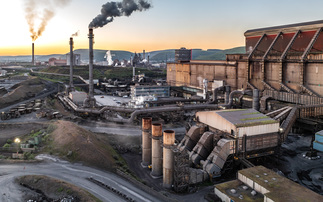
Industry Voice: Phoenix Group's James Wilde explains why divestment alone is a blunt instrument when it comes to fossil fuel assets
Phoenix Group has, along with hundreds of national governments and businesses, set ambitious greenhouse gas emission reduction targets. As the UK's largest long-term savings and retirement company, with around £270bn assets under administration, our investment portfolio is where we have both the biggest climate-related impact and the greatest exposure to risks and opportunities. Climate change is the highest priority ESG factor facing investors and our aim is to ensure we deliver real economy emission reduction across our portfolio, while managing the risks and protecting the interests of our customers and shareholders. Our active approach to stewardship will be vital in achieving this aim, as will clear public policy on climate being set by governments that drives real action.
Stewards of the real economy
Like many large asset owners, we are a ‘universal owner', which means we have a diversified portfolio of investments in companies across the real economy, including sectors with high emissions. In our Climate Report we confirmed that our listed equities and credit portfolio, around £160bn, had a carbon footprint of around 15 million tonnes of CO2 per year at a 2019 baseline. While sectors such as energy, utilities and materials make up less than a quarter of our listed assets, they account for almost 90 per cent of financed emissions. These sectors are exposed to high transition risks: unless they transform their businesses, they will decrease in size and profitability or disappear altogether as governments and societies move to a low-carbon economy.
As a universal owner, we look to manage exposure to systemic risks like climate and wider environmental disruptions that impact portfolios through costs created by some companies and absorbed by others. We therefore have an interest in the long-term health of the whole financial system[3] and the real economy.[4] Reduced system-level risks, or 'better beta' as it is known in modern portfolio theory, could improve financial outcomes over the long term.[5] Equally, universal owners may capture the benefits from innovation and collective action to address market failures.
So our objective, as reflected in the industry initiatives we have joined, is to deliver real economy emission reduction, while protecting the interests of our customers and shareholders.
Divestment alone is a blunt instrument
While there is widespread consensus about the urgent threat of climate change, the more complex question is to what extent, when and how we should use our capital to help decarbonise the real economy.
It seems intuitive that if you want to decarbonise your portfolio, you would sell holdings in businesses with high emissions. Certainly, pension schemes and other institutional investors have faced mounting pressure to sell, or divest[6], from high carbon investments. The fossil fuel divestment movement has grown, with 1,485 funds, representing $39tr in assets, having made full or partial divestment commitments.[7]
However, the decision is more nuanced. There is limited evidence of a clear connection between divestment, corporate strategy and ultimately emissions reduction. Divestment alone seems to have limited direct impact on fossil fuel's access to equity or debt.[9] In practice, selling fossil fuel holdings means they may be bought by an investor less concerned about emissions. Moreover, the amounts involved may be too small a fraction of fossil fuel companies' capital pool to affect their cost of capital and real investment decisions.
Active stewardship is a critical lever
However, even if the direct impacts of divestment on listed companies are limited, they can start to shift market norms by raising awareness, stigmatising target companies and influencing public policy. These indirect levers only enhance the importance of asset owners and their managers engaging in active stewardship, as is the case at Phoenix Group.
Our strategy, which we will set out in more detail later this year through our net zero plan and stewardship reports, is one of ‘engagement first'. While we apply an exclusion policy covering cases incompatible with a low carbon future and successful shareholder dialogue, we believe that engaging with corporates is an effective way for institutional investors to support climate action. Stewardship covers different types of activities from engaging directly or collaboratively with other peer shareholders, to using the power of voting to support actions or express discontent, to shaping the public policy debate and encouraging regulators to incentivise the decarbonisation of the economy. We have developed a climate change scorecard which we use to engage with top emitting companies representing the largest holdings across sectors, to support their transition to a low-carbon economy.
We have defined an engagement list of 25 companies that account for 53 per cent of our financed emissions in material sectors in corporate and listed equity holdings using data from our carbon footprint baseline. Some of these companies are targeted by Climate Action 100+ (an organisation we are a member of) as being among the largest emitters in the world. We work collaboratively with Climate Action 100+ and the regional investor networks in order to help bring about better comes in carbon emissions.
Our engagement with companies where we are invested helps ensure they are setting robust targets and taking action to meet them through a transition to low-carbon business models. We are working to hold companies to account and have clear escalation routes. In the most extreme situations when companies are unresponsive to extensive efforts of dialogue, we could recommend divestment as the ultimate sanction. What is more, as a universal owner, we own, or are responsible for, emissions across the value chain of the global economy, from demand to sell-side. Our stewardship activities will reflect that to some degree. The high emitting sectors we're focusing our efforts on include oil and gas, utilities, mining, steel, cement, transportation firms and others. When high emitting companies see that their suppliers are decarbonising at a faster rate, or increasingly so, that demand for low carbon products increases, this spurs action, greater transparency and competition.
But we know we need to do more
We are working collectively with other investors (in a way compatible with competition requirements) through industry forums such as the United Nations-supported Principles for Responsible Investment (PRI), the Net Zero Asset Owners Alliance and the Institutional Investors Group on Climate Change (IIGCC) to amplify our voice and bring about corporate change. Ahead of COP27 we were part of a group of global investors calling on overgnments to take early and decisive policy action to accelerate and scaling up private capital flows to low-carbon investment.[12]
Effective forward signalling, by us, our peers and Government can affect companies' behaviour and potentially reduce the systemic risk of a messy transition by accelerating loss of confidence in future stranded assets and avoiding infrastructure lock-in.
What else needs to happen?
While it is vitally important that we and other large asset owners take ambitious steps to tackle climate change, we cannot do it alone. In particular, governments set public climate policy, which will be a key determinant of the speed and shape of changes in the global economy. Ahead of the Government's revised Net Zero Strategy this year, we and our industry peers have called for clear policy on decarbonisation pathways to avoid the choice between divestment and emissions continuing in the real economy; or continuing to hold assets but failing to meet our targets. Ultimately as a long-term, universal owner, our interests and those of our customers are aligned with a healthy macro-economy and the action on climate resilience that is driving the Government's own targets on net zero.
James Wilde is chief sustainability officer of Phoenix Group.
For more on our approach to sustainable investment and stewardship see Phoenix Group's reports and policies at thephoenixgroup.com.
This article is sponsored by Phoenix Group.








